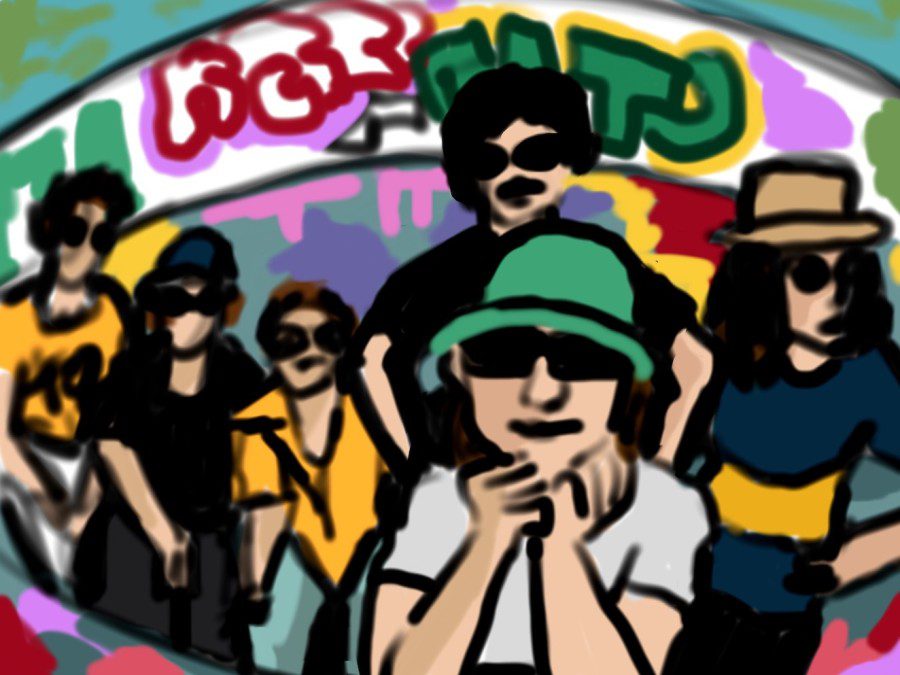Review: ‘Changes’ elevates King Gizzard & the Lizard Wizard’s discography
King Gizzard’s newest album takes on an existential perspective, and showcases the band’s robust musical ability.
Changes,” the newly released album by Australian rock band King Gizzard & the Lizard Wizard, infuses elements of jazz into their rock staple. (Illustration by Susan Behrends Valenzuela)
November 7, 2022
Though usually classified as a psychedelic rock band, King Gizzard & the Lizard Wizard has produced an incredibly diverse discography that proves that it is much more than just that. The group has covered a wide range of musical terrain, having experimented with metal, folk, pop, funk and all kinds of rock. With “Changes,” King Gizzard & the Lizard Wizard explores jazz further, firmly adding it to their musical tool belt.
The Australian band is known for releasing music at a breakneck speed, having released 20 full-length albums since 2012. 2022 has been no exception. The group has released five full-length albums just this year, and three albums in October alone. “Changes” was the last of the three that was released, but has actually been a work in progress since 2017. Bandmate Joey Walker has said that the “complexity of ‘Changes’ … prevented the band from feeling like the album was ever truly finished.”
King Gizzard & the Lizard Wizard has constructed the album around only two chords: D major and F# major. Every time the chord changes, the entire key changes as well. The band has explored jazz before, mainly on the album “Sketches of Brunswick East,” where they collaborated with Mild High Club, but “Changes” significantly expands the band’s musical vocabulary. It showcases the band’s musicianship and creative ability given the constraint of only being able to modulate between two chords.
The band has stated that they consider their albums to be one big song. The harmonic unity of “Changes” cements the album as a single entity more so than their past work. The first track, “Change,” is 13 minutes long, and sets the foundation for the rest of the album. It begins humbly, with the simple tapping of a hi-hat, which is then joined by a piano melody and the occasional plucking of an upright bass. As the song continues, it gets increasingly more complicated with the introduction of new instruments and futuristic sounds, including a harp and then a synth, which make the track sound like it’s melting.
The track is constantly evolving, oscillating between sections of cacophony and tranquility. All three lead singers feature in the song’s 12 verses — the first time this has happened in King Gizzard’s history — to provide the band members’ perspectives on change. They probe at the futility of humanity, insurmountable inequality and the possibility of an apocalyptic future. Walker sings: “Hospital inane / Meaningless and grey / But lie within the walls and the significance / Will change / What would it take for us to change the game? / Maybe our existence is significance in vain / The significance has changed / Maybe our existence is significance in vain.”
The rest of “Changes” reckons with existential questions as well, from the consequences of pollution in “Astroturf” to what happens after death in “No Body.” “Exploding Suns” is the penultimate track, and it confronts the fact that life could be extinguished at any moment with no warning — for example, if the sun were to spontaneously explode. The song calls back to “Change” as its instrumentation is a slowed-down version of a melody established in the album’s introductory track. Every track, in fact, refers to musical elements established elsewhere in the album. Much like a fugue of classical music, the band plays off of each other, weaving a web of interlocking musical themes that are delightful to listen to piece by piece — or track by track — but whose full picture is not revealed unless the album is played in full.
The musical and lyrical aspects of “Changes” work together to create a cohesive picture of how King Gizzard & the Lizard Wizard views humanity. Jazz is perhaps the best vehicle in which to explore existential themes because it is inherently abstract and embraces the unknown. Improvisation is a key component of the genre that forces musicians to work through discomfort and fear to succeed. In this way, jazz is more about the journey than it is about the destination and that may be the message written between the lines of this album.
Lyrically, “Changes” is overwhelmingly pessimistic about the fate of humanity. But it is also filled with open-ended questions, such as in the last track titled “Short Change.” The band sings, “Who should we please? / Who’s to believe? / Who should we change for? / Who could we be? / When my race is done, how did I run? / Did I par the course and pass the baton on?” These questions could be interpreted as having a resigned tone, or they could also be somewhat optimistic, asking humanity to reflect upon itself and enact change for the sake of a better future. Jazz vibraphonist Stefon Harris has said there are no mistakes in jazz, only opportunities. Thus, utilizing jazz to tell the story of this album could be a way to say that there is always an opportunity for humanity to do better and to rectify mistakes, no matter how hopeless the future may appear.
“Changes” is like a sedimentary rock — although it may not sound like a ground-breaking album on the first listen, every next one unveils more layers of King Gizzard & the Lizard Wizard’s musical ability and artistry. This album proves that this band is just as capable of speaking on serious topics as it is on silly ones, while always maintaining the ability to sculpt refreshing and unusual musical textures.
Contact Sandy Battulga at [email protected].
















































































































































